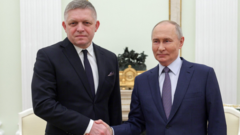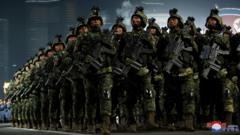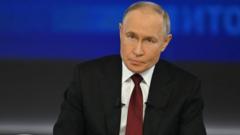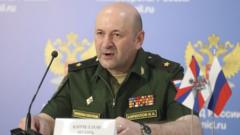In a crucial move to support his war-worn citizens, Ukrainian President Volodymyr Zelensky has recently enacted a one-off financial aid program while simultaneously increasing taxes to bolster the war effort against Russia, unveiling a complex strategy to balance state funding with public sentiment. Just days before these announcements, Zelensky declared that every Ukrainian citizen would be eligible for a grant of approximately 1,000 hryvnias, or about $24, a modest amount in comparison to Ukraine's average monthly salary hovering around $500. This initiative is part of an effort aimed at addressing the economic hardships faced by many families as the war grinds on.
Zelensky's Financial Aid Initiative Aimed at Soothing War Fatigue in Ukraine

Zelensky's Financial Aid Initiative Aimed at Soothing War Fatigue in Ukraine
As winter approaches, Ukraine's President Zelensky introduces a modest financial aid program amidst growing economic challenges due to ongoing conflict with Russia.
In his recent address, Zelensky emphasized the tangible impact of this aid, noting that over 3.2 million Ukrainians have already applied for the financial support. Observers see this grant as a strategic move to regain support from a population increasingly fatigued by the protracted conflict and internal issues, including corruption scandals and social divides exacerbated by military mobilization efforts.
Recent polling data highlights a notable shift in public trust towards President Zelensky, which although remains relatively robust at 59%, has declined from 77% over the past year. This decline underscores a crucial juncture for Zelensky as he seeks to maintain public faith while navigating the pressures of an ongoing war and domestic dissatisfaction.
While the financial aid program may be perceived as a lifeline for many, analysts suggest that it is also a calculated gesture to shore up his popularity, reflecting the challenging landscape of a leader balancing national security and the welfare of his citizens in the shadow of a relentless war.
Recent polling data highlights a notable shift in public trust towards President Zelensky, which although remains relatively robust at 59%, has declined from 77% over the past year. This decline underscores a crucial juncture for Zelensky as he seeks to maintain public faith while navigating the pressures of an ongoing war and domestic dissatisfaction.
While the financial aid program may be perceived as a lifeline for many, analysts suggest that it is also a calculated gesture to shore up his popularity, reflecting the challenging landscape of a leader balancing national security and the welfare of his citizens in the shadow of a relentless war.






















